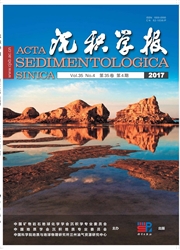

 中文摘要:
中文摘要:
在四川北部松潘西北和甘肃南部合作市一带的上三叠统(深海沉积)复理石中发现了数套火山(碎屑)岩夹层。利用UPb同位素测年,获得4件安山岩、凝灰岩样品锆石的年龄加权平均值分别为205.9±1.6Ma、208.9±1.8Ma、210.4±1.6Ma和212.3±1.5Ma,时代属于晚三叠世诺利期晚期—瑞提期早期。此系第一次较为精准地报道松潘-甘孜褶皱带晚三叠世复理石火山岩夹层及其可能代表的火山喷发年龄。研究结果表明,直到瑞提期早期松潘-甘孜古残留海盆还未停止接受沉积物供给。该套火山(碎屑)岩的测年结果为松潘-甘孜褶皱带上三叠统复理石岩石地层单元的划分和对比提供了重要参考,同时为进一步约束华南与华北板块碰撞-造山事件时限提供了新证据。
 英文摘要:
英文摘要:
Several intercalations of volcanic and pyroclastic rocks were firstly discovered within the flysch of the Songpan-Ganzi folded belt. Samples were taken in northwestern Songpan of Sichuan and southwestern Hezuo of Gansu. Using U-Pb isotope measurement of LA-ICP-MS, the authors conducted dating of four samples and obtained ages of 205.9±1.6Ma, 208.9±1.8Ma, 210.4± 1.6Ma and 212.3 ± 1.5Ma separately, precisely showing the late Norian-early Rhaetian age of the Late Triassic. These are the age representatives of volcanic eruptions during the flysch accumulation and indicate that the deposition might have not stopped until the early Rhaetian. The discovery of the dated volcanic rocks would benefit the stratigraphic classification and correlation of the Upper Triassic flysch within the Songpan-Ganzi folded belt, and can provide evidence and age constraints for the collision and orogeny between blocks of South and North China.
 同期刊论文项目
同期刊论文项目
 同项目期刊论文
同项目期刊论文
 期刊信息
期刊信息
